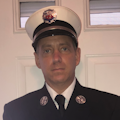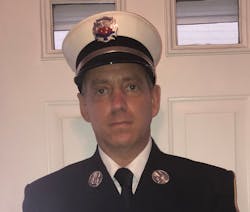In 2015, after a battery of tests, I was diagnosed with post-traumatic stress disorder (PTSD). I immediately saw this as a “weakness” and wanted to keep everything private so I would not be labeled with the negative stigma associated with it. Through the years, my thought process on that has changed significantly, and I now believe that we as firefighters must make this cultural change as well within the fire service. It is up to us to underscore that PTSD is present among all ranks, and that there is help out there for us.
What is PTSD?
PTSD is clinically diagnosed by healthcare professionals. In order to be diagnosed, an individual has to meet certain “clusters” of symptoms found in the Diagnostic and Statistical Manual of Mental Disorders (DSM-5). According to the Anxiety and Depression Association of America (ADAA), symptoms of PTSD may include the following: “Re-experiencing the trauma through intrusive distressing recollections of the event, flashbacks and nightmares, emotional numbness and avoidance of places, people and activities that are reminders of the trauma and increased arousal such as difficulty sleeping and concentrating, feeling jumpy, being easily irritated and angered.”[1] These clusters must be debilitating to the individual for over one month or longer. Many times, PTSD does not even become noticeable for several months to even years after a traumatic event.
Our struggle
I experienced many of the cluster of symptoms, including flashbacks of previous traumatic incidents, dissociation from reality, severe tremors, reoccurring traumatic nightmares, hypervigilance, displaced anger, intrusive thoughts, feeling isolated, inability to recall key aspects of incidents, difficulty sleeping, suicidal attempts, aggressive mood and difficulty experiencing positive feelings.
I thought I was all alone suffering from this, but after receiving treatment at the International Association of Fire Fighters Center of Excellence (IAFF COE), that quickly changed. At the IAFF COE, I met many fellow brothers and sisters from throughout the country, all of whom were trying to deal with similar issues as me.
I now believe that every first responder has some form of PTSD. How can we not, especially with what we see on daily basis? According the IAFF, “1 in every 5 firefighters will experience PTSD at some point throughout their career.”[2] That statistic is just staggering. At your next shift meeting, look around and consider that 1 in 5 of you will be affected.
Firefighting is a brotherhood/sisterhood. We cook, eat, sleep and share some of the most gruesome incidents together. After our tour of duty, we are sent home to try and recover from the tragedies we have seen—and then the cycle begins again. How is a person supposed to do this for 30 or more years without being impacted in a negative way?
Coming to terms with the diagnosis
Through treatment I have learned that resilience is one the best tools that firefighters can use in order to minimize the damage done to our psyche. The fire academy and paramedic school never equipped me with the understanding that we must “unload” (aka talk about) these traumatic incidents as a way of healing. I first heard the term PTSD at the Veterans Administration while dropping off a patient. I automatically associated PTSD with the military and the tours of combat solders.
The next time I heard the term, a doctor was telling me that he believed I had PTSD after seeing me in crisis while in the emergency room for suicidal ideation/suicidal attempt. When I heard him say that, it truly shocked me. I immediately felt shameful and guilty, and wondered how my fellow brother and sister firefighters would accept me, especially as an officer.
After years of thinking I was immune to PTSD, I began to realize how much this disorder was a part of my life. One of the first signs my family noticed was that I was never able to separate my work life from my home life. I was constantly waiting for the next big event to occur, and my family suffered by not having me available to them.
One of the other major signs I noticed was attempting to perform my paramedic skills. One call I can remember clearly involved a teenager who overdosed and was discovered by his mother. I just happened to be the first person into the bathroom where he was lying unconscious and not breathing. This room could only fit myself and the patient. My fellow crewmembers prepared the equipment needed so I could perform the skills necessary.
I remember starting interosseous (IO) intravenous (IV) access. The placement of the IV was correct, but I could not run any of the fluid through the line. We were eventually able to get the patient out of the confined space and start another IV. My fellow brothers actually watched me perform the skill and even they could not understand why it was not successful. I had probably started well over 100 IOs and never had difficulty.
After the call, I went back to the firehouse and practiced on the IO mannequin at least 25 times without an issue. It ultimately turned out that there was a defect in the needle I used, but doubting my abilities never left my mind. I would be driving on the highway and find myself thinking about patients I took care of, sometimes even seeing their faces and the tremendous amount of pain they were in. These thoughts and flashbacks were very real to me—and intrusive.
I could not understand why this was happening. Suicidal ideation started to creep into my mind. The only thing that actually kept me alive was my daughter Madison and thinking about her without a father. I honestly thought things would be better and the pain would be over by ending my life. This dark place just felt better alone rather than talking with someone about it. But having friends, family and fellow brother and sister firefighters there to catch me was a significant factor.
Getting help
A couple years ago, I took one of the most important steps in my life—I asked for help. I ended up being diagnosed with PTSD, anxiety and depression. I had in-patient stays at both the McLean Hospital LEADER (Law Enforcement Active-Duty Emergency Responder) program, which was born out of the Boston Marathon bombings and the IAFF COE in Maryland. The treatment I received was unbelievable. I met more of my fellow brother and sister firefighters from around the country who were suffering from very similar issues.
At the COE, we had several formal educational classes along with Medical Director Dr. Abby Morris overseeing our care. But it was speaking with my peers during “downtime” that proved to be one of the best treatments I received. I felt so comfortable speaking with total strangers about what I was feeling, as they understood how I was feeling and responded without judgement. This was one of the most powerful emotions I have ever felt. To this day, I still speak with many of my fellow firefighters throughout the country; we actually keep watch over each other. I can call them day or night when I am having a tough time with things. This is something that I never felt comfortable doing until my in-patient stay at the IAFF COE.
I believe the two most important tools I received from my in-patient stays are resilience and thought restructuring. I am now better able to understand my triggers. Before treatment, they just came head-on at me without knowing that these feelings were starting to overwhelm me. I look at resilience as being ready for anything that life has to offer, good or bad. When one builds resilience, they naturally become stronger.
Thought restructuring sounds very simplistic, and it really is as long as you are in a stable state of mind. This treatment helped me look into the incidents that were troublesome, critique them with my fellow peers, and then have a different perspective on the incident and outcome. I will warn you that when calls are critiqued in this manner, fellow peers speak very straightforward about whether they agree with the decisions. There is no sugar-coating that occurs; you get their valid and honest opinions. This type of exposure therapy is very tough because many times we feel like we are reliving the incident, but the overall outcome is tremendous in terms of restructuring how we view the incident.
As firefighters, we all want to improve our skills and master those skills so we are better able to help people. Unfortunately, our victims are often past the point where we can help them. Understanding this concept and not “owning” our patient’s experience or others’ grief is a fine line that we must walk. We can care for our patients deeply, but we cannot take these painful experiences home with us. I believe this is one of the areas where I fell short. But this also became a strength because I was stronger for going through what I had to in order to continue healing. I can honestly say that in the past, every patient I have ever had contact with, good or bad, took a piece of me, leaving me with just a shell of who I was. Learning how to restructure my thinking has led me on the path to recovery. I even intend on obtaining my second master’s degree—this time in social work—in the near future. I will hopefully be able to help my fellow brother and sister firefighters deal with PTSD.
Courage to ask
I was not just “fixed” after attending these programs. It took a lot of hard work and effort to build my resilience up to the point where the events that I have been exposed to are still present, but they are much more manageable now. It might seem easy just to ask for help, but that was one of the toughest things I had to do throughout my career. Never forget that those who are strong ask for help. Many tough firefighters may laugh or just not pay attention to this statement. I would like to challenge them. Take it from one of your peers that this is 100 percent the truth. It takes much more courage to ask for help than to try and deal with problems in unhealthy ways. There are so many firefighters struggling, and there is help available; you just have to ask. Find someone who you are comfortable confiding in and start the path to recovery rather than struggling one more minute. Please stay safe, brothers and sisters.
Richard Stack has been a full-time firefighter for 20 years and a registered paramedic for over 26 years, currently serving as a captain with the North Attleboro, MA, Fire Department. He has a master’s degree in public administration. Stack can be reached at [email protected].
References
1. Anxiety and Depression Association of America. “Symptoms of PTSD.” 2018. https://adaa.org/understanding-anxiety/posttraumatic-stress-disorder-ptsd/symptoms.
2. Ault, T. “Suffering in silence: Firefighters battle PTSD.” KOIN6. 2016. http://www.koin.com/news/firefighters-speak-out-about-battling-ptsd/960263463.
Sidebar: Resources
As noted, two places were integral in my recovery:
· McLean Hospital LEADER program in Belmont, MA – (800) 333-0338
· The International Association of Fire Fighters Center of Excellence (IAFF COE) in Upper Marlboro, MD – (855) 232-2707
About the Author

Richard Stack
Richard Stack has been a full-time firefighter for 20 years and a registered paramedic for over 26 years, currently serving as a captain with the North Attleboro, MA, Fire Department. He has a master’s degree in public administration. Stack can be reached at [email protected].
